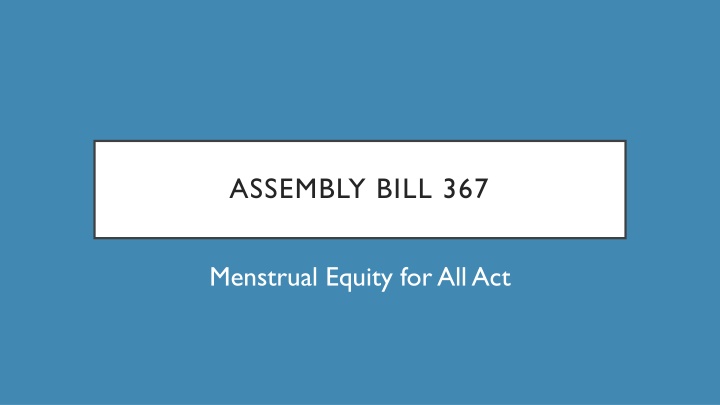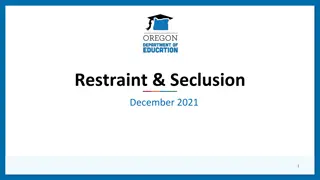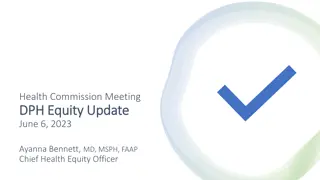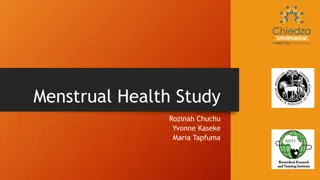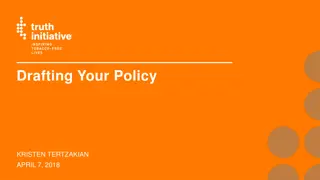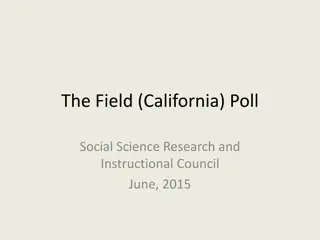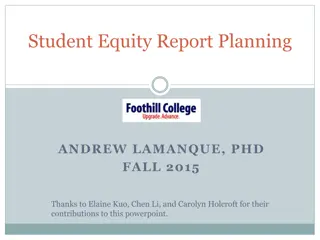Menstrual Equity for All Act - Ensuring Access to Menstrual Products on Community College Campuses
Effective January 1, 2022, Assembly Bill 367 mandates community college districts to provide free and easily accessible menstrual products in central locations on campus to address period poverty and ensure menstrual dignity for all students. The law aims to destigmatize menstruation, improve access to diverse menstrual products, and involve student leadership for equitable implementation beyond state mandates.
Download Presentation

Please find below an Image/Link to download the presentation.
The content on the website is provided AS IS for your information and personal use only. It may not be sold, licensed, or shared on other websites without obtaining consent from the author.If you encounter any issues during the download, it is possible that the publisher has removed the file from their server.
You are allowed to download the files provided on this website for personal or commercial use, subject to the condition that they are used lawfully. All files are the property of their respective owners.
The content on the website is provided AS IS for your information and personal use only. It may not be sold, licensed, or shared on other websites without obtaining consent from the author.
E N D
Presentation Transcript
ASSEMBLY BILL 367 Menstrual Equity for All Act
WHAT DOES THE LAW SAY? Effective January 1, 2022, community college districts shall stock an adequate supply of menstrual products,[1] available and accessible, free of cost, at no fewer than one[2] designated and accessible central location on each campus. A location s accessibility shall be determined by considering all of, but not limited to, the following factors: a. Hours of operation, relative to hours that students are on campus; b. Proximity to high-traffic areas on campus; c. Accessibility by students of all genders and regardless of physical ability; d. Privacy, including whether accessing products would require interaction with staff or other students; and e. Safety Locations may include student centers, libraries, wellness or health centers, pantries, and study rooms. A notice must be posted in a prominent and conspicuous location in all women s restrooms, all- gender restrooms, and in at least one men s restroom regarding the requirements of this Act.
THE WHY OF THE LAW Research shows many students struggle to access menstrual products and have missed class because they lacked access to menstrual products. 51% of students have worn period products for longer than recommended. Period poverty (lack of access) is real. It disproportionately affects students of color, low-income students and students with disabilities. Menstrual dignity for two spirit, transgender, intersex, nonbinary, gender non-conforming students means minimizing negative attention that could put them at risk of harm.
GAIA REPORT & RECOMMENDATIONS Increase equitable access so our students can focus on their education by regularly stocking a variety of quality menstrual products in a range of sizes in restrooms across the campus; Make the invisible visible! Destigmatize. Educate about the use of menstrual products: days with heavier menstrual flow require changing menstrual products more often; they are not one size fits all; there are cultural differences; Provide better signage, include the name/email of a person that is regularly reachable by students; Reduce targeting/stigmatizing by stocking menstrual products in more than one men s restroom on campus;
GAIA REPORT & RECOMMENDATIONS Collaborate with student leadership to get student input/feedback to ensure we re providing full, equitable access to menstrual products; to increase understanding of equity and accessibility issues; to lead by example Beyond the reimbursable state mandate, pursue directing supplemental and other grant monies towards strong implementation of AB 367; Destigmatize menstruation by using gender inclusive language Instead of . Girls, women Menstrual hygiene Feminine hygiene products SAY People who menstruate Menstrual health Menstrual products
AB 367 INTENT [To] provide for the health, dignity, and safety of menstruating students at every socioeconomic level, normalize menstruation among all genders, and foster gender competency in California schools.
